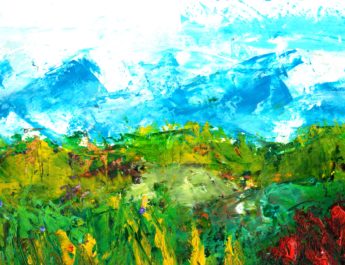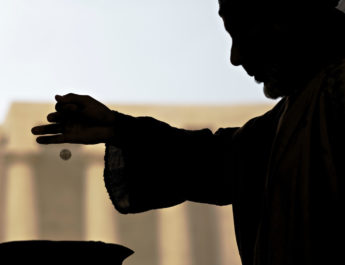Psalm 96:7-10
Narrative Lectionary 417
7 AscribeA to the Lord,B O familiesC of the peoples,D
ascribe to the Lord gloryE and strength.F
A “ascribe” = yahab. This is give, put, bring, take. It is to give in a literal or figurative sense.
B “Lord” = YHVH. From havah (to be, become) or hayah (to come to pass, become, be). This is the name of the God of Israel, the self-existent and eternal one, the tetragrammaton. This pronunciation has been lost to time so “Lord” is generally used in its place.
C “families” = mishpachah. From the same as shiphcah (maid, maidservant); root means to spread out. This is one’s circle of relatives – clan, family, kindred.
D “peoples” = am. From amam (to darken, hide, associate; creating shadows by huddling together). This is people or nation. It can be used specifically for a tribe, collectively of troops or armies, or figuratively to refer to a flock of animals.
E “glory” = kabod. From kabad (to be heavy, weighty, burdensome). This is weighty. Figuratively, glorious, abundant, riches, honor, splendor – a reference to one’s reputation or character. This word is often used to describe God and God’s presence.
F “strength” = oz. From azaz (to be strong, become fixed, be bold, prevail, be impudent; it means to be stout literally or figuratively. A Late Hebrew word). This is strength in the sense of force, majesty, praise, material and physical strength, the abstract notion of security. It can also speak of social or political power.
8 Ascribe to the Lord the glory due his name;G
bringH an offering,I and comeJ into his courts.K
G “name” = shem. May be from sum (to put, place, set). This is name, fame, renown. A name was thought to indicate something essential about a person – something about their individuality. So, this word can also mean honor, authority, or character.
H “bring” = nasa. This is to lift in a broad sense, literally and figuratively. So it could be to carry, take, or arise. It could also be bring forth, advance, accept.
I “offering” = minchah. This is a gift or an offering, particularly a sacrificial one that is generally bloodless and given spontaneously (voluntarily).
J “come” = bo. This is to enter, come in, advance, fulfill, bring offerings, enter to worship, attack. It can also have a sexual connotation.
K “courts” = chatser. From chatsar (to blow a trumpet, trumpeter, to surround); from chatsotsrah (trumpet). This is an enclosure or court – a yard that is fenced in. It could also be a village or hamlet that is walled in.
9 WorshipL the Lord in holyM splendor;N
trembleO beforeP him, allQ the earth.R
L “worship” = shachah. This is to bow down, make a humble entreaty, to do homage to royalty or to God.
M “holy” = qodesh. This is set apart and so sacred. God is different from us and so God is holy/set apart. Things we dedicate to God’s service are set apart for God and so they, too, are holy, etc.
N “splendor” = hadarah. 5x in OT– 2x in Psalms, 2x in Chronicles, and 1x in Proverbs. From hadar (ornament, splendor, beauty, dignity, majesty, magnificence, and glory); from hadar (to honor or adorn; majestic, respected, glorious; to favor or honor; to be proud). This is beauty, honor, decoration.
O “tremble” = chul. This is whirling around so dancing as in a circle or writhing in pain. It is used particularly for the pain of childbirth or from writhing due to fear. It can also be falling in pain or waiting.
P “before” = paneh. From panah (to turn, face, appear). This is face in a literal or figurative sense. It could be face, presence, anger, respect. It can also be used of God to indicate divine favor or presence.
Q “all” = kol. From kalal (to complete). This is all or every.
R “earth” = erets. Root may mean to be firm. This is earth, ground, field land, or country.
10 Say among the nations,S “The Lord is king!T
The worldU is firmly established;V it shall neverW be moved.X
He will judgeY the peoples with equity.”Z
S “nations” = goy. From the same root as gevah (the back, person, or body); related to gev (among); related to gaah (to rise up). This is nation or people. Often used to refer to Gentiles or foreign nations. It can also be used figuratively for a group of animals. This is where the Yiddish “goy” comes from.
T “is king” = malak. To be or become king or queen, to rise to the throne, to be crowned. By implication, to take counsel. This word may be from the Hebrew word for king “melek” or vice versa.
U “world” = tebel. From yabal (to lead, bring, carry, conduct; properly, to flow; to bring or lead with fanfare). This is world, confusion, inhabited part of the earth, but also used for the whole world.
V “is firmly established” = aph + kun. Aph is also, furthermore, even. Kun is, properly, in a perpendicular position. So, it is set up in a literal sense – establish, fix, fasten, prepare. In a figurative sense, it is certainty, to be firm, faithfulness, render sure or prosperous.
W “never” = bal. From balah (to grow old, wear out, consume, waste, enjoy, fail, decay). This is not, lest, neither. Properly, it refers to a failure, so it implies nothing or not at all.
X “be moved” = mot. This is to shake, slip, falter, stagger, move, fall, give way, waver, be carried.
Y “judge” = din. This is to judge, defend, dispute, govern, quarrel, plead.
Z “equity” = meshar. 19x in OT. From yashar (to be straight, right, even, agreeable). This is evenness, straightness, prosperity, or uprightness.
Image credit: “Stained Glass Window Full of Light and Color” from StockPhotosforFree.com, 2012.




